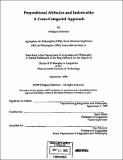| dc.contributor.advisor | Irene Heim. | en_US |
| dc.contributor.author | Schlenker, Philippe (Philippe D.), 1971- | en_US |
| dc.contributor.other | Massachusetts Institute of Technology. Dept. of Linguistics and Philosophy. | en_US |
| dc.date.accessioned | 2009-01-13T19:12:33Z | |
| dc.date.available | 2009-01-13T19:12:33Z | |
| dc.date.copyright | 1999 | en_US |
| dc.date.issued | 1999 | en_US |
| dc.identifier.uri | http://dspace.mit.edu/handle/1721.1/9353 | en_US |
| dc.identifier.uri | http://hdl.handle.net/1721.1/9353 | |
| dc.description | Thesis (Ph.D.)--Massachusetts Institute of Technology, Dept. of Linguistics and Philosophy, 1999. | en_US |
| dc.description | Includes bibliographical references (p. 173-177). | en_US |
| dc.description.abstract | Universal Grammar uses the same distinctions (features) and the same interpretive procedures for reference to individuals, times, and possible worlds. We give a partial argument for this hypothesis: person, tense and (maybe) mood can be treated on a par when they occur in reported speech. We consider several generalizations that hold across sortal domains, and develop a theory of propositional attitudes and indexicality that captures these facts, and treats all three categories on a par. First, we extend the notion of 'Sequence' phenomena from tense to person. In Russian, the tense of a direct discourse can be preserved in reported speech, but in English tense agreement, i.e. 'Sequence of Tense', must generally hold. The same contrast exists between English and Amharic pronouns: in Amharic the indexical pronoun of a direct discourse can be retained in reported speech, while in English person agreement, i.e. 'Sequence of Person', must hold. Second, we extend the notion of 'Logophoricity' from person to tense. In Ewe, the indexical pronoun of a direct discourse can only be reported in indirect discourse if a special form is used, one that never occurs outside of attitude environments - a 'logophoric pronoun'. But logophoric tense/mood also exists, and is instantiated by one of the subjunctive forms that exist in modem German (the 'Konjunktiv I'). Third, we observe that both tense and person display the same idiosyncratic behavior in Free Indirect Discourse - an interesting fact given that other indexical elements pattern differently. Finally, we speculate that the notion of Obviation can be extended from person to tense, and suggest that English past tenses are the temporal counterpart of obviative person markers in Algonquian. Our main auxiliary assumption is that attitude operators are quantifiers over contexts of speech/thought, which allows an indexical expression to be evaluated with respect to the context of a reported speech act, and thus to be shifted. Every attitude operator is thus a Kaplanian 'monster', and shifted indexicals are analyzed as a morphological variant of De Se pronouns. Logical forms are assumed to be uniform across languages, with morphology as the only source of cross-linguistic variation. | en_US |
| dc.description.statementofresponsibility | by Philippe Schlenker. | en_US |
| dc.format.extent | 209 p. | en_US |
| dc.language.iso | eng | en_US |
| dc.publisher | Massachusetts Institute of Technology | en_US |
| dc.rights | M.I.T. theses are protected by
copyright. They may be viewed from this source for any purpose, but
reproduction or distribution in any format is prohibited without written
permission. See provided URL for inquiries about permission. | en_US |
| dc.rights.uri | http://dspace.mit.edu/handle/1721.1/9353 | en_US |
| dc.rights.uri | http://dspace.mit.edu/handle/1721.1/7582 | en_US |
| dc.subject | Linguistics and Philosophy. | en_US |
| dc.title | Propositional attitudes and indexicality : a cross categorial approach | en_US |
| dc.type | Thesis | en_US |
| dc.description.degree | Ph.D. | en_US |
| dc.contributor.department | Massachusetts Institute of Technology. Department of Linguistics and Philosophy | |
| dc.identifier.oclc | 44442094 | en_US |
